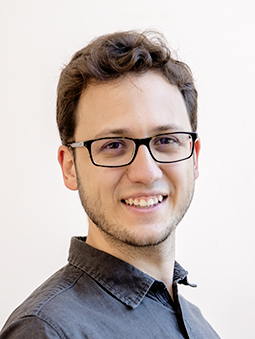New analysis methods for computer systems can prevent outages in the offshore industry. This will lead to both time and money being saved.
By Sissel Eikeland
Luis Miguel López Ramos is a postdoctoral research fellow and affiliated with SFI Offshore Mechatronics (SFI) and the Wisenet Lab at the University of Agder, where he researches signal and data processing.

Postdoctoral Research Fellow Luis Miguel López Ramos is affiliated with SFI Offshore Mechatronics at UiA.
The SFI which López Ramos is affiliated with is the largest research project ever led by UiA. The project period lasts from 2015 to 2023 and aims to increase cooperation between the business sector and prominent research environments.
Analysing Data
For the last two years, López Ramos has developed a data analysis method where an algorithm predicts future behaviour in a system based on previous behaviour. López Ramos’s algorithm can go through a large amount of data and calculate when an unexpected change may occur. The method can also reveal information about the location of the change point in the system.
“The information we get from predicting the behaviour of a time series of data signals may provide simple and comprehensible explanations for complex phenomena in oil and gas platforms,” López Ramos says.
Unconventional Procedure
Most of the projects in the SFI use a model-based procedure. That means trying to create a simulation model based on the laws of physics on a computer first. When making such simulation models, you often have to make some assumptions and simplifications.
“In López Ramos’s work, you do not need to make such assumptions, because a data-based procedure is used instead, ” Professor and SFI Centre Director Geir Hovland says.
By analysing large amounts of data from complex systems through the algorithm, correlations in data can be discovered that would otherwise not have been discovered by conventional procedures,” Hovland says.
The methods can be transferred to other fields
Data systems in the offshore industry are equipped with sensors which continuously monitor variables such as pressure, temperature and amount of oil flowing through the pipes. Still, it is not easy to know how the system will act at any given time.
“Oil and gas platforms have very complex systems. Technology that can discover behaviour that may lead to system errors will have a large significance for these platforms” López Ramos says.
Even though the SFI mainly helps the offshore industry with innovative mechatronics systems, López Ramos’s methods may be of great value for other fields as well.
“His methods are general and not specifically adapted to the oil and gas industry. Therefore, it is possible to transfer them to other fields. In the future, we hope that his algorithms also can be used within health services for treating patients, among other things,” Hovland says.
López Ramos will continue to work at UiA with fundamental research on mathematic modelling for two more years. He hopes that his research will lay the foundation for other types of methods for analysing data.
“I hope that in the future my methods can be of use to several sectors. In the course of this year, some of the methods should be ready for further development,” López Ramos says.

Postdoctoral Research Fellow Luis Miguel López Ramos from UiA is developing an algorithm that can go through a large amount of data and calculate when and where unexpected changes may occur.
